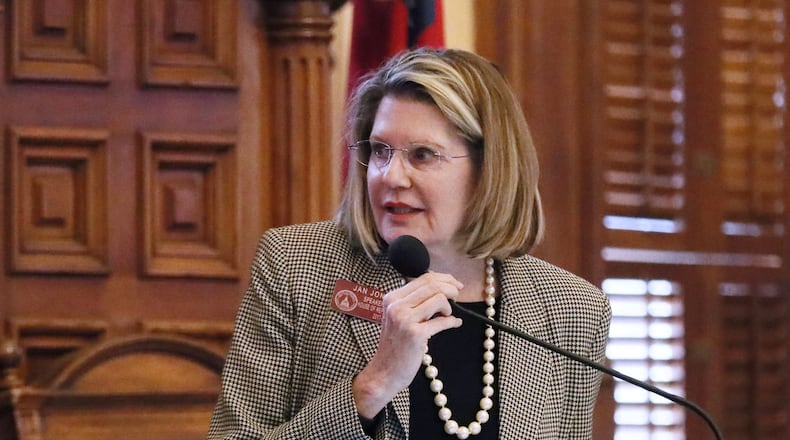Georgia's most powerful female lawmaker moved to derail efforts to remove the state's 4 percent tax on menstrual products.
Though not a regular member of the panel that was discussing the proposal, House Speaker Pro Tem Jan Jones sat with members of the House Ways and Means subcommittee taking up House Bill 8 during a hearing Wednesday.
She told the bill’s sponsor that she didn’t think it addresses the stated goal of removing the burden of taxing women who struggle to afford basic necessities.
Ten states have abolished similar taxes.
Jones, a Milton Republican, said: “Because someone asks for something and because some other state does it and because one aspect of the federal government classifies it a certain way is not compelling to me. But I am appreciative to the advocates that are drawing attention to what I think is a (real issue), and that is girls and women who don’t have the means.”
Instead, Jones said she has proposed setting aside up to $1 million for the state Department of Education to provide menstrual products to girls in schools in low-income areas.
The House has carved out $500,000 in its proposed budget for next fiscal year, and Jones said she is going to ask the Senate to allocate an additional $500,000.
Jones is asking that an additional $1 million go to county health departments to provide the menstrual products to low-income women.
The committee took no action on the bill Wednesday, making its passage unlikely.
State Rep. Debbie Buckner, a Junction City Democrat, said women are unfairly taxed when buying tampons and other menstrual items — products classified by the U.S. Food and Drug Administration as medical devices. She has pointed out there is no equivalent product for men.
“The majority of people that need these products are women that are making less than (their male counterparts), so it is a burden of an expense that they have at least once a month for at least 40 years,” Buckner said.
According to an estimate from the state Department of Audits and Accounts, waiving the tax on menstrual products would decrease the state’s revenue by about $9 million in 2020. Georgia’s budget for fiscal 2019 was $26.9 billion.
The department estimated that women and girls between the ages of 10 and 54 spend about $63 each year on menstrual products. Waiving the tax would save women about $2.52 a year — something House Ways and Means Chairman Brett Harrell, R-Snellville, said didn't seem to address the problem.
Buckner introduced a similar bill last year, but it went nowhere.
Buckner said while she would like Georgia to remove the tax from menstrual products, she is hopeful that money will be set aside to help low-income women and girls.
“That’s important, but it wasn’t only about the money,” she said. “It was about the fairness.”
Later Wednesday, the full Ways and Means Committee approved several tax-break extensions, including a 20-year one on jet fuel that will save Delta Air Lines and other air carriers in Georgia about $40 million a year.
Stay on top of what’s happening in Georgia government and politics at ajc.com/news/georgia-government/.
About the Author
Keep Reading
The Latest
Featured




